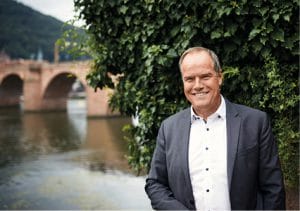Interview with Covenant of Mayors board member Eckart Würzner
on the sustainable development of European cities

Prof. Dr. Eckart Würzner
(photo: @ 2019 Julian Beekmann)
One of the major initiatives promoting the development of smart sustainable cities in Europe is the Covenant of Mayors for Climate & Energy. It was launched in 2008 with the ambition to gather local governments voluntarily committed to achieving and exceeding the EU climate and energy targets. Currently the Covenant of Mayors comprises more than 10,200 municipalities worldwide with a total population of 322 million inhabitants. Eurescom message editor-in-chief Milon Gupta interviewed Heidelberg’s mayor Prof. Dr. Eckart Würzner about the progress towards sustainable development in his own city and the cities of Europe. Prof. Dr. Würzner has contributed to this progress not only as mayor, but also as political board member of the Covenant of Mayors for Climate & Energy and president of the climate protection network Energy Cities.
What is your city’s most important sustainable development goal for the next 10 years?
E. Würzner: Heidelberg has been committed to sustainable development since the 1990s as a direct result of the Aalborg Charter [Charter of European Sustainable Cities and Towns Towards Sustainability, 1994 – the editor]. Since then, the urban sustainable development plan has been continuously updated. The newest update is currently running, which is for the first time based on the SDGs [17 Sustainable Development Goals of the United Nations – the editor]. One of the most important goals is SDG 13 – Climate Action.
Our climate protection concept passed the city council 25 years ago and has been constantly renewed. In 2019 Heidelberg declared the climate emergency. This created new measures and accelerated the implementation of local climate protection measures for achieving Heidelberg’s goal of climate neutrality by 2050.
Which activities have you planned and launched to achieve your city’s sustainable development goals?
E. Würzner: Climate protection in Heidelberg extends into numerous administrative areas and also into further important SDGs, including SDG 7 [Affordable and Clean Energy], SDG 9 [Industry, Innovation and Infrastructure], and SDG 11 [Sustainable Cities and Communities]. In addition to the energy transition, there is also a need for a traffic transition towards environmentally compatible transport and energy-efficient technologies.
In Heidelberg the greatest savings in CO2 emissions can be achieved in the area of building renovations, renewable energies, energy efficient buildings and the transport sector. That is why our focus is on sustainable renovation and sustainable mobility. Therefore the municipality cooperates in various fields of action with local stakeholders like the university, the municipal utility, and the enterprises.
What is the role of ICT for achieving your city’s sustainable development goals?
E. Würzner: Heidelberg is very active in the field of digitisation. The city continues to make steady progress towards becoming a smart city. From broadband expansion and public WiFi to online public participation and open data, digitised infrastructure is set to become as much a part of essential local authority services like electricity, gas and water. The objective is to use new technologies to sustainably improve the lives of all our citizens.
We implement intelligent solutions for different areas of urban development with the help of innovative technologies. In the area of climate protection, for example, these are intelligent house controls to increase resource efficiency. In the case of municipal buildings, energy consumption has been reduced by 50{b28ae05319d94bff0b4d65c5a9f4524dd588360f05c61ef440e1608e0a1c4144}.
How are Energy Cities and the Covenant of Mayors for Climate & Energy contributing to achieving the vision of smart sustainable cities in Europe?
E. Würzner: The political goals of the networks are to empower the cities in their actions and to strengthen collaboration between them. It is important to give the cities a louder voice at the international level. Therefore, we must link the political commitment of the cities to advocacy on European level. The networks should act like a lobby for financial resources, programmes and European laws for climate protection at city level. The cities put policies and institutional settings, frameworks of climate and energy goals into concrete practice. It is not enough for mayors to be experts at negotiations or conferences. It is most important to give them the right to be a part of the decision-making process. Energy Cities and the Covenant of Mayors can provide the framework for this work. Climate issues must become the guiding principle of EU politics, not only in position papers. The European Green Deal is a first and important step. In cooperation with other networks, Energy Cities should ensure that the Green Deal becomes a reality.
Which major societal, economic and technological challenges need to be tackled in the coming years on the way to smart sustainable cities in Europe?
E. Würzner: The question is if smart cities will be low-energy cities with energy-saving and climate-protection objectives. We have to offer solutions for the contradiction between promoting energy-saving objectives and increasing the number of electronic devices exponentially. More importantly, digital technology may one day be able to optimise the urban system. We need a complete change of paradigm.
Inventing short-distance cities, reclaiming urban space monopolised by cars and returning it to pedestrians and cyclists as well as relocating a significant share of the production – including food production – to the city are just a few examples of urban policies that are more important for smart cities than just achieving the energy transition.
Ultimately, smart sustainable cities are first and foremost cities designed for enabling their inhabitants to lead a free, low-energy life, without being trapped in a technical system.